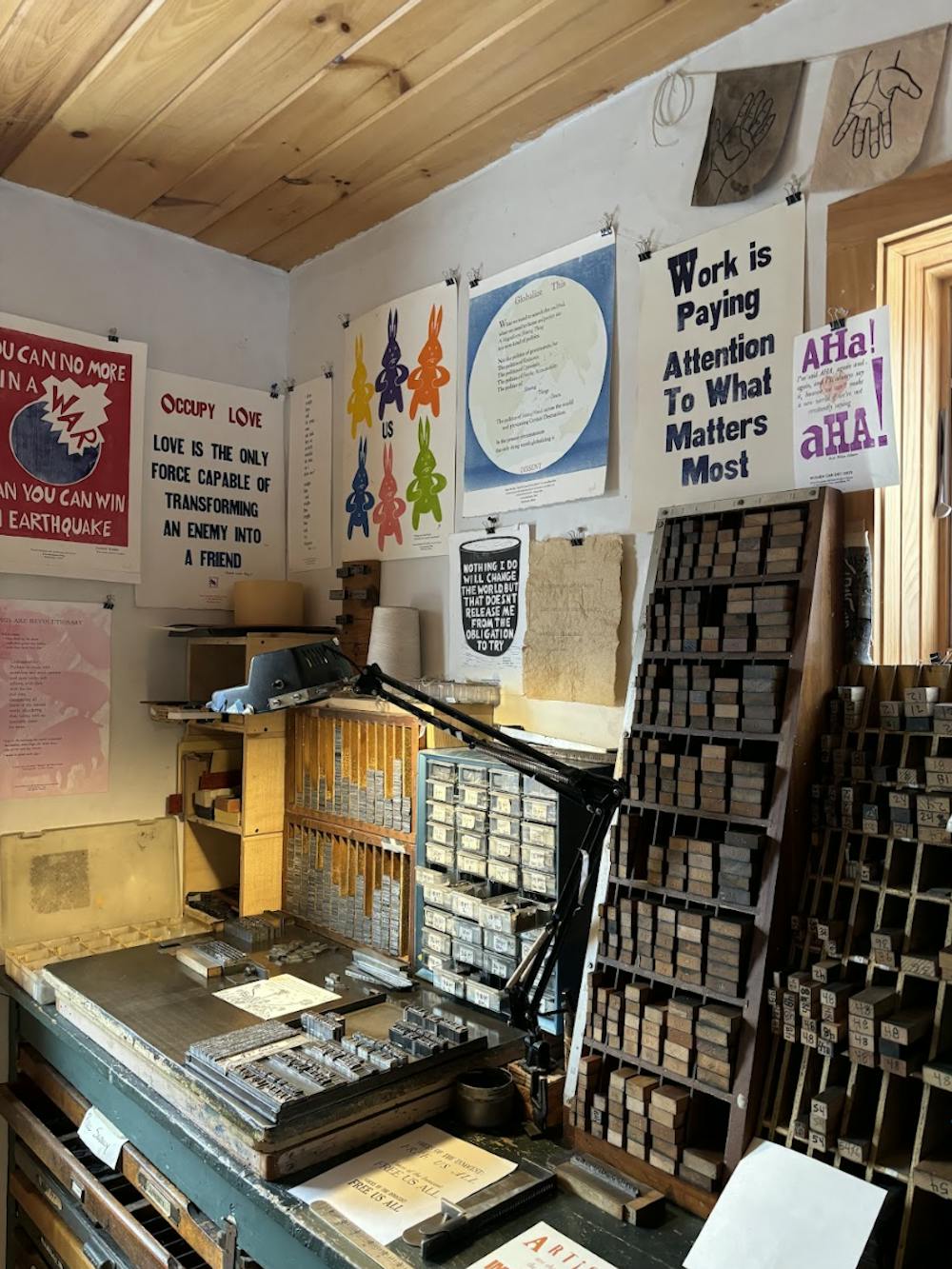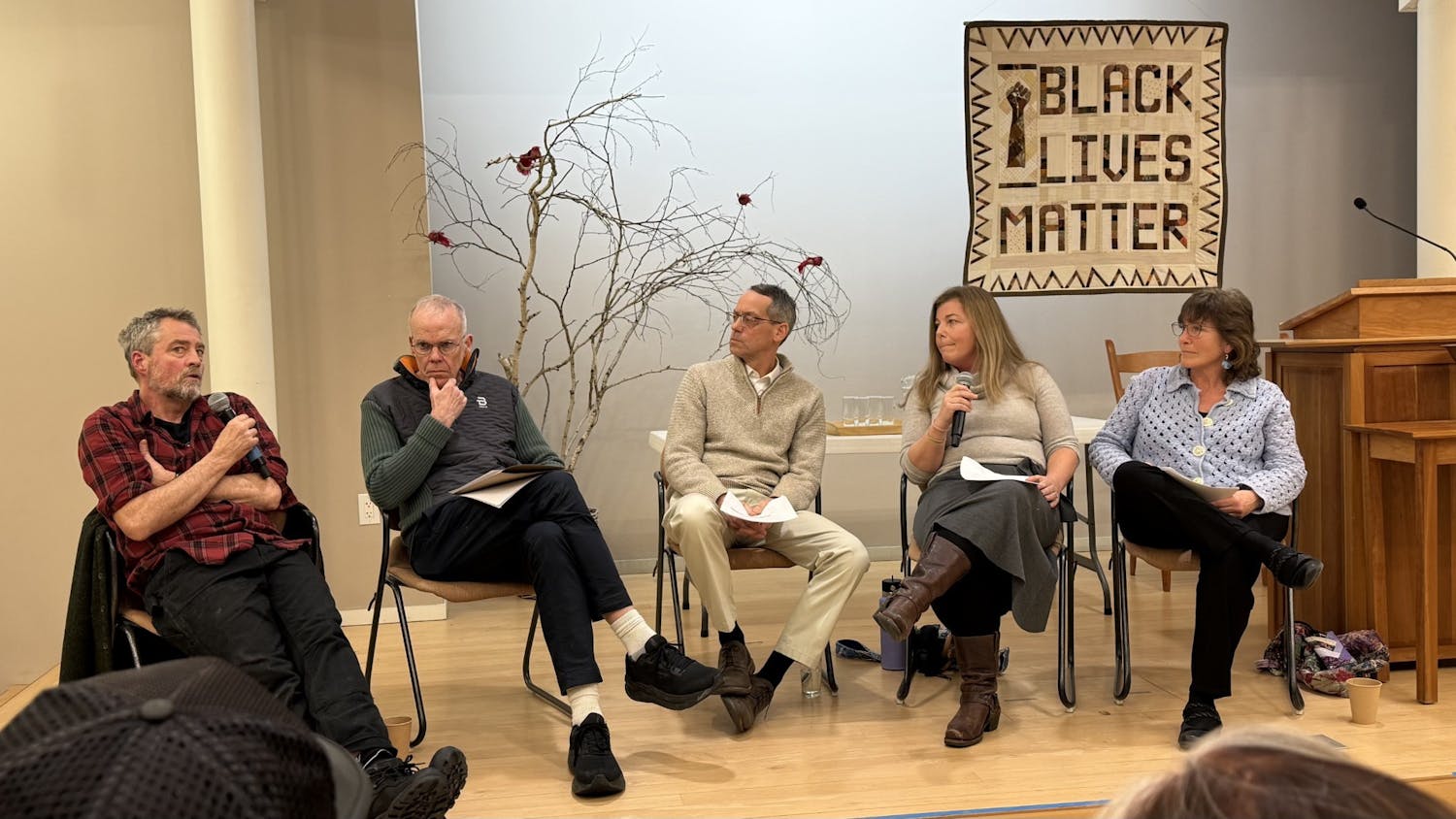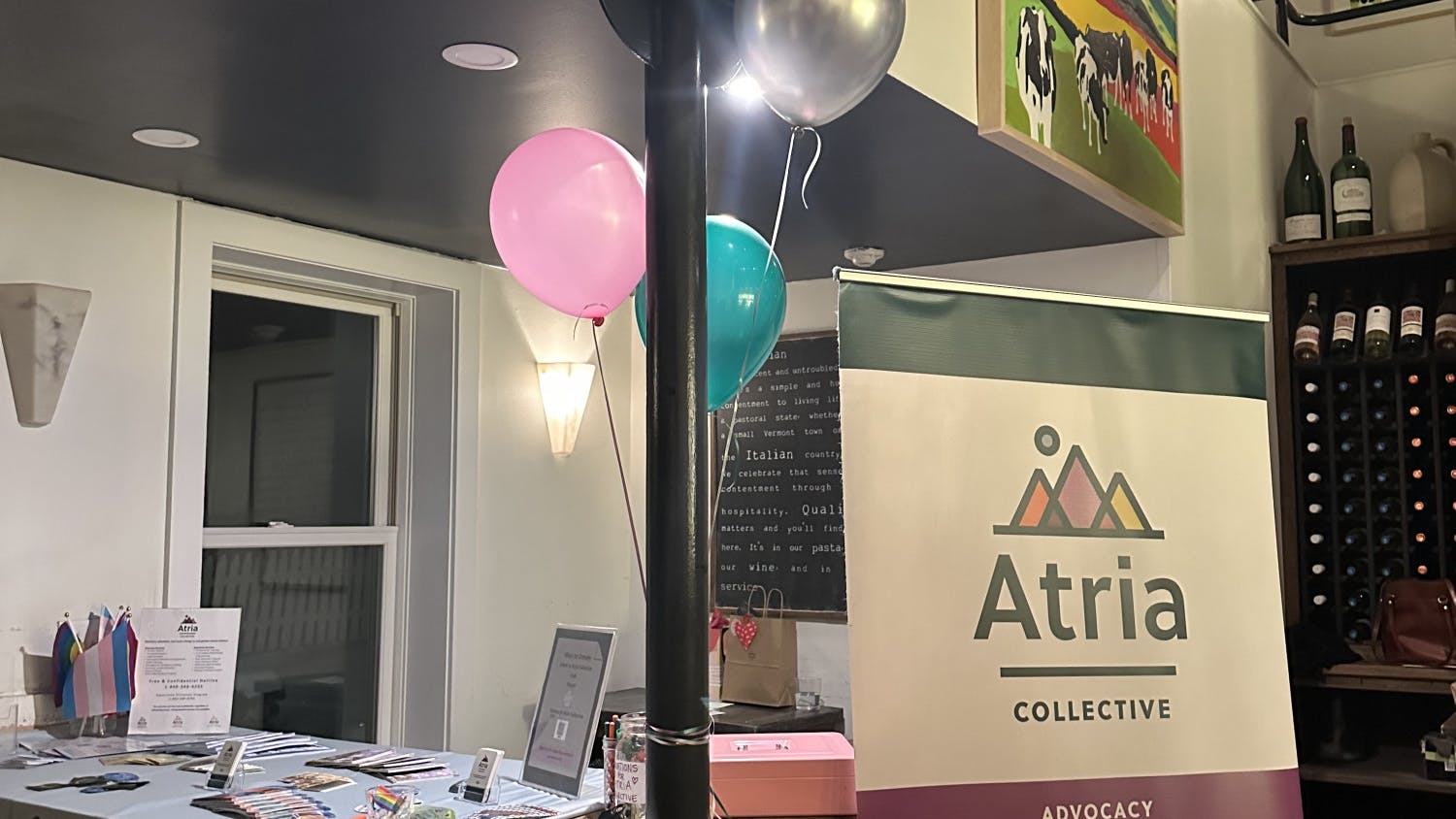If you take a look at the dorm room walls of Middlebury students, chances are you might see some of John Vincent’s colorful letterpress work. Vincent founded Revolutionary Press, a 501(c)(3) nonprofit printing press, in 2010, and aims to spread radical and revolutionary ideas. Since 2016, Revolutionary Press has raised $219,470 for numerous organizations dedicated to nonviolence and social justice.
Vincent, originally from the Washington D.C. area, has no formal art background. He worked in law enforcement in New Hampshire before returning to D.C. and serving in the National Guard for six years. In 1985, Vincent returned to New England and in 2000 he took over In the Alley Bookshop in Middlebury, where he first became acquainted with letterpress printing.
Prior to starting Revolutionary Press, Vincent — a voracious reader — enjoyed finding radical and revolutionary quotes and hanging them on the door of his bookstore. As he was closing the bookstore one day, someone came in and inquired about letterpress books. That interaction immediately piqued Vincent’s interest, and from there he embarked on a journey to marry his love of finding inspiring words with art.
“I didn’t know what it would be at the time because I had no real model to work off of. I just know what I wanted to do was print radical and revolutionary words to inspire people to do something creative around government and the way we run our country,” Vincent said.
When asked why letterpress printing, Vincent said, “It seemed kind of tactile. It was real. It was something old.” After closing the bookstore in 2007, Vincent was gifted his first printing press. He moved to Maine and began letterpress printing before returning to Vermont eight years ago. Today, he is based in New Haven, Vt.
Vincent’s first printing project was the organization’s mission statement, which borrows words from the Declaration of Independence, “Print and disseminate Radical & Revolutionary ideals to impel the People to Creatively Act on their Right and their Duty to alter or abolish the Present Form of Government and institute a New and more Humane Form of Self Governance.”
To Vincent, it is important to have this mission be a guiding principle for all of his printing projects. Vincent finds inspiration organically, often through reading.
“I find the words by reading a lot. Not doing Google searches. I want to have it in context, so if someone asked me about it, I can say, well, you know, it actually comes from this piece,” he said.
Some of Vincent’s work is accompanied by a linocut: a stamp carved out of a sheet of linoleum. While Vincent dabbles in linocut, he primarily enjoys setting type. Many of the linocuts featured in prints are made by people who connect with Vincent’s vision, including former and current Middlebury students.
Vincent has collaborated with artists who found Revolutionary Press at art markets or through word of mouth. “I’ve never really advertised it,” he said. “There’s no reason to advertise it. It’s more of what the universe provides. Serendipity.”
Gabby Chalker ’24 heard about Revolutionary Press through mutual friends and started working with Vincent over J-Term. “It’s a bit of a web of Middlebury students finding him and being interested in either his work or printmaking in general.”
Chalker, who enjoyed printmaking in high school, said she is inspired by Vincent’s dedication to social justice and resonated with the accessibility, beauty and messaging of Revolutionary Press’ work.
“It’s such a tangible example of true activism and community,” she said.
When asked about his favorite piece, Vincent said, “It’s always the one I’m working on.” When I visited his studio in January, he was printing the poem “Calla Lilly,” written by Spoon Jackson, a poet incarcerated in California. According to Vincent, a lot of the work the Press is doing currently is focused on issues of incarceration.
Revolutionary Press recently collaborated with Vermont Works for Women and Conversations on the Open Road on the art exhibition “Finding Hope Within: Healing & Transformation Through the Making of Art Within the Carceral System,” which features work from incarcerated individuals in Vermont, Maine and Massachusetts.
Vincent often sources papers for his prints from the Peace Paper Project, “an international community-arts initiative that utilizes traditional papermaking as a form of trauma therapy, social engagement, and community activism,” according to the organization’s website.
Vincent described printing on handmade paper as even more powerful than just printing on regular cardstock. “So I try to do that as much as possible,” he added.
He hopes to get more involved with papermaking in the future.
Revolutionary Press prints, postcards and bookmarks are sold in-person locally and can be found downtown at The Vermont Book Shop. Vincent emphasized the importance of having in-person interactions and frequenting local businesses, such as his travels to local markets like Bristol’s Art On Main.
Revolutionary Press also has a yearly subscription service, where individuals can make a donation ranging from $15-30 and get one to three prints per month in the mail. Vincent enjoys supporting the U.S. Postal Service and giving people a reason to get excited to check their mailboxes.
Currently, over 450 people are signed up for the subscription service.
Vincent looks forward to continuing his work and finding inspiration all around him.
“Thoughts about printing come to my mind through stuff that I’m reading,” he said. “So I keep a lot of reading journals and mark up my own books. Sometimes, I’ll stop reading and come right in here and work directly from that page, and I think I know exactly what it’s going to look like. And then other times I’ll write it down, it percolates, six months later, I think to myself, ‘Wait a minute, I’m going to print this. I have an idea now for it.’ Sometimes, it’s a slow process, and other times, it’s very immediate. I can never tell.”

Charlie Keohane ’24 (she/her) is an Editor at Large. She previously served as the SGA Correspondent and a Senior Writer.
She is an environmental writing major and a psychology minor from Northern California. Outside of academics, Charlie is a Senior Admissions Fellow at the Middlebury Admissions Office. She also is involved with the women’s track team and hosts Witching Hour, a radio show on 91.1 WRMC. In Spring 2023, she studied abroad in Copenhagen, Denmark. In her free time, she enjoys hiking, watching Greta Gerwig movies, polar plunging, sending snail mail, and FaceTiming her rescue dog, Poppy.




